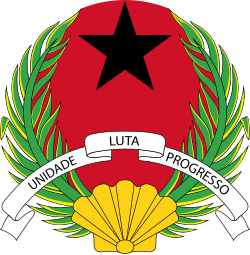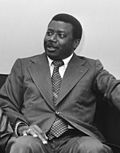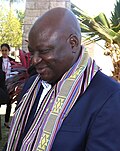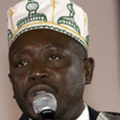No. Portrait Name(Birth–Death) Election Term of office Political party Took office Left office Tenure 1 Francisco Mendes (1939–1978) [ a] 1976–77 24 September 1973 7 July 1978 [†] 4 years, 286 days PAIGC 2 Constantino Teixeira (1933–1988) — 7 July 1978 28 September 1978 83 days PAIGC 3 João Bernardo Vieira (1939–2009) [ b] — 28 September 1978 14 November 1980 2 years, 47 days PAIGC Vacant (14 November 1980 – 14 May 1982) 4 Victor Saúde Maria (1939–1999) [ c] — 14 May 1982 10 March 1984 83 days PAIGC Post abolished (10 March 1984 – 27 December 1991) 5 Carlos Correia (1933–2021) 1994 27 December 1991 26 October 1994 2 years, 303 days PAIGC 6 Manuel Saturnino da Costa (1942–2021) — 26 October 1994 6 June 1997 2 years, 223 days PAIGC (5) Carlos Correia (1933–2021) — 6 June 1997 3 December 1998 1 year, 180 days PAIGC 7 Francisco Fadul (born 1953) 1999 3 December 1998 19 February 2000 1 year, 78 days Independent 8 Caetano N'Tchama (1955–2007) — 19 February 2000 19 March 2001 1 year, 28 days PRS 9 Faustino Imbali (born 1956) — 21 March 2001 9 December 2001 263 days Independent 10 Alamara Nhassé (born 1957) — 9 December 2001 17 November 2002 343 days PRS 11 Mário Pires (1949–2023) — 17 November 2002 14 September 2003(Deposed in a coup ) 301 days PRS Vacant (14 September 2003 – 28 September 2003) 12 Artur Sanhá (born 1965) — 28 September 2003 10 May 2004 225 days PRS 13 Carlos Gomes Júnior (born 1949) 2004 10 May 2004 2 November 2005 1 year, 176 days PAIGC 14 Aristides Gomes (born 1954) — 2 November 2005 13 April 2007 1 year, 162 days PAIGC 15 Martinho Ndafa Kabi (born 1957) — 13 April 2007 5 August 2008 1 year, 114 days PAIGC (5) Carlos Correia (1933–2021) — 5 August 2008 2 January 2009 150 days PAIGC (13) Carlos Gomes Júnior (born 1949) [ d] 2008 2 January 2009 10 February 2012 3 years, 39 days PAIGC — Adiato Djaló Nandigna (born 1958) — 10 February 2012 12 April 2012(Deposed in a coup ) 62 days PAIGC Vacant (12 April 2012 – 16 May 2012) — Rui Duarte de Barros (born 1960) — 16 May 2012 3 July 2014 2 years, 48 days PRS 16 Domingos Simões Pereira (born 1964) 2014 3 July 2014 20 August 2015 1 year, 48 days PAIGC 17 Baciro Djá (born 1973) — 20 August 2015 17 September 2015 28 days PAIGC (5) Carlos Correia (1933–2021) — 17 September 2015 27 May 2016 253 days PAIGC (17) Baciro Djá (born 1973) — 27 May 2016 18 November 2016 175 days PAIGC 18 Umaro Sissoco Embaló (born 1972) — 18 November 2016 30 January 2018 1 year, 73 days PAIGC 19 Artur Silva (born 1956) — 30 January 2018 16 April 2018 76 days PAIGC (14) Aristides Gomes (born 1954) 2019 16 April 2018 29 October 2019 1 year, 198 days PRID (9) Faustino Imbali (born 1956) — 31 October 2019 8 November 2019 10 days Independent (PMP –affiliated) PRS [ 2] (14) Aristides Gomes (born 1954) — 8 November 2019 28 February 2020 112 days PRID 20 Nuno Gomes Nabiam (born 1966) — 28 February 2020 8 August 2023 3 years, 161 days APU 21 Geraldo Martins (born 1967) 2023 8 August 2023 21 December 2023 135 days PAIGC 22 Rui Duarte de Barros (born 1960) — 21 December 2023 7 August 2025 1 year, 229 days PAIGC 23 Braima Camará (born 1968) — 7 August 2025 28 November 2025(Dismissed following a coup ) 113 days Madem G15 24 Ilídio Vieira Té (born 1983) — 28 November 2025 Incumbent 63 days PRS 














